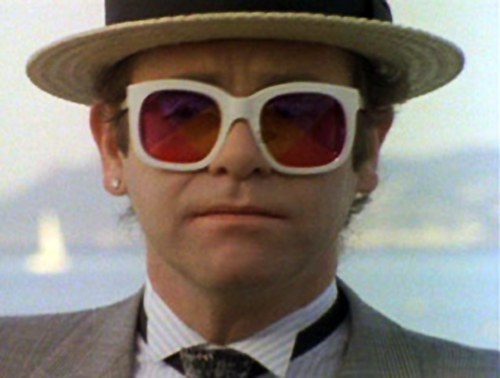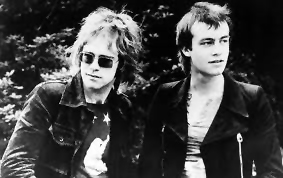
| Search JoyZine with Google Site Search! |
|
Elton John interview by Robert Haber
Elton John was one of the biggest names of the '70s who fell on hard times for quite a while. But now, at age 36, he has made a stunning comeback, even receiving a nomination for the joyously autobiographical "I'm Still Standing" video. His latest album, Too Low for Zero, has spawned three hits; he is releasing a special Christmas album—just voice and acoustic piano; and he will be appearing in a movie with Liza Minelli to be released this coming summer. Following is a recent interview with the man whose debut album in 1970 was the tremendously influential Tumbleweed Connection. Q: After releasing Single Man in 1979, you went through a tremendous change in your life. Your records weren't selling as well as in the past, and the pubic eye was slowly losing sight of you. What happened to change all that? ELTON: I spent many hours thinking how slowly my success had been demolished. Instead of worrying about the next record, I was fighting to stay alive. I was going bats—I fired all my maids, butlers, cooks, people to cut my hair... But I knew I could be comfortable with Elton John the person, not just the entertainer. Q: Is that when you began to work with Bernie Taupin again? ELTON: We worked on a few cuts, though he was still mailing his material to me. But, it was good to be collaborating with him again. Q: Is that why you brought the old band back and used Taupin's lyrics on the latest album? ELTON: I always figured, "What worked once can work again." Actually, it wasn't so much that, but to be able to work with these guys and Bernie again was a tremendous lift. Q: Why did you switch to Geffen Records? ELTON: I have always admired David Geffen for his work, not to mention the fact that John Lennon was on Geffen. Geffen has been supportive since I began recording with them in 1980. Q: You're doing a solo album with just voice and piano, and Geffen is not supporting that effort. Why not? ELTON: Well, first of all, they didn't think it was a business-like thing for me to do. Also, most of my colleagues felt I was doing something like Springsteen did [with Nebraska], but this is something I've wanted to do for a long time. Q: How did you convince Keith Olsen to produce the project? ELTON: I've run into him a few times and I explained to him what my project was all about. He was really into some of the ideas I had come across with. Q: How different was it to be in the studio with just you and a piano instead of the usual group? ELTON: The concept felt kind of strange. For Keith, it wasn't as hard of a mix to do, though I provided a variety of keyboards mixed in with some electric organ. I made some mistakes when recording because I'm not used to just hearing keyboards and vocals—you always wait to play on cue with instruments. Q: On your last album, Too Low for Zero, I was quite impressed with your vocals. How would you compare this album with the older material? ELTON: Me and Bernie spent some time polishing the melodies to bring my voice to a stronger tone. I felt the album contained a fresh impact. Q: I especially liked "Princess" and "Saint—I felt that both of those songs reached a vocal and lyrical strength that you've never expressed before. What were those two songs about? ELTON: "Princess" was a woman I once loved. She was serving time in prison. Bernie and I were proud of this one. "Saint" was like an image of me fading away. Q: How hard has it been to take all the criticism? You've had to deal with tremendous pressure, and then had to fight to regain the spotlight you had been in for so long previously. ELTON. Outrageous. Sometimes I just wanted to scream. I don't think losing some of the spotlight bothered me. A lot of it had to do with the respect that I lost. Kids would use a silly stereotype not to buy my records, or like me at all. There was a lot of bad hype I had to dissolve. Q: You've just turned 36. Does touring get harder to deal with? ELTON: Sometimes it can be awfully hard to deal with the need for stamina that goes with consistent schedules of dates to play. Doing a solo tour will be less stress as it will just be me and the piano. Q: You kind of cake-walked into the business with some lucky breaks, but weren't there times in the beginning when things were tough?
ELTON: Yes. In the beginning Bernie and I were writing copy material for performers like Englebert Humperdink and Tom Jones. Steve Brown, our coproducer at the time, told us we weren't writing the material we were capable of. It was time for me to start singing my own music with Bernie's lyrics. Q: You then were introduced to drummer Nigel Olssen and guitarist Dee Murray. Didn't you record your first concert on November 17, 1970 with them? ELTON: That was recorded in New York City, which was the beginning of a great relationship with Dee and Nigel and, eventually, Davey Johnstone. Those were the best years—the early ones usually are. Q: I've always admired the structure of your music, but some critics felt that your music all sounded the same. Didn't that criticism bother you? ELTON: I never thought it did but, sure, especially when you try so hard. I know I've always written music at a fast pace, but that's how it works in the business. Q: On the solo LP you have titles such as "Hello Friday," "Isn't It Muddy Out There," "Crashing in Your Nightmare" and "Headaches Need Relief." Those don't sound like the usual Elton John melodies. What brought on these unique themes? ELTON: It's the first time I've written the whole thing by myself. I was in a very weird mood at the time I was writing, but these have been very moody times for me. I was hoping to capture an audience that I hadn't reached before. Q: Was it difficult at first, writing all the songs by yourself? ELTON: Perhaps at first. But it was such a challenging project. I just kept separating out different ideas. Q: The Elton/Taupin era captured a new audience in the early Seventies. These days, you have maintained an older-crowd following with songs like "Blue Eyes, "Empty Garden" and "Chloe." Is that why the latest album seemed to change all that, with songs like "I'm Still Standing" and "Kiss the Bride"? ELTON: When I signed with Geffen, it was my goal to do everything to get back to the popularity I had once achieved. That's why we set up so many things to attract the press and fans. "The Fox" didn't do as well as we'd hoped but "Jump Up" and "Too Low for Zero" have done really well. "Too Low for Zero" was directed at the pop market, while the first two maintained a middle of the road sound. Q: How have you liked doing videos? ELTON: It depends on how long they take. But they are a necessity these days. It's another aspect that has increased the recording industry most handsomely. Q: What else is in the future for Elton John? ELTON: A movie with Liza Minelli, a tour, and a new album with the band, beginning sometime in March or April. |

